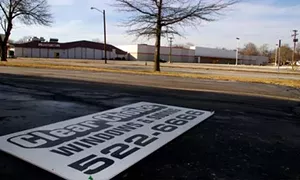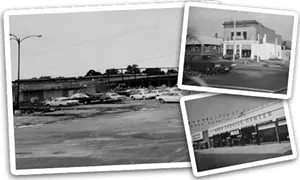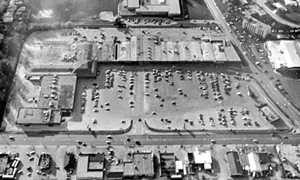Shopping Center Springfield Il Next to Franklin School
Untitled Document
T he middle-school kids who trudge past the immense beige structure on South MacArthur Boulevard twice a day aren't old enough to remember when the building housed a Venture store. Even many of their parents are too young to recall the days when the Red Grill restaurant, Woolco store, and automotive center stood there.
Over the years, the expansive swath at the intersection of MacArthur and Cherry Road has been occupied by shoe sellers, specialty clothing stores, chain retailers, a temporary auto-sales lot, and even a house of worship. "When I was a kid, anything you wanted was on MacArthur," says Abe Christofilakos, who grew up in Jerome and owns the Gyros Stop restaurant, near where MacArthur intersects with Wabash Avenue. That MacArthur — the one that Christofilakos and many other Springfieldians once knew — is barely recognizable these days. Today some 20 buildings along MacArthur, between South Grand and Wabash avenues, are vacant — an amazing statistic, considering that more than 20,000 vehicles travel the corridor each day. Residents who live near MacArthur, which once supported two movie theaters and three grocery stores, must travel at least a mile and a half to go to the supermarket and three miles to check out a new flick, although a high-interest payday-advance loan is only steps away. Longtime area residents say that things are getting worse, and they're worried. Kathleen Sorensen, president of the Washington Park-Knolls Neighborhood Association, says the decline has been occurring steadily for years. "I think it's obvious just by the way the businesses are moving out and the kinds of business that are moving in. Mom-and-pop stores haven't been able to make it," Sorensen says. She notes that even chain operators can't seem to hang on MacArthur. When the Schnucks supermarket, previously National Foods, closed and relocated to Chatham Road, people could still get some groceries across the street at Kmart, formerly Venture. Christofilakos remembers the area as the epicenter of Springfield's retail universe. "Everybody shopped at Venture," he recalls. "There's nothing to offer people on MacArthur now. "This whole side of town is deteriorating."
B y no means is MacArthur Boulevard the only prominent street that's hurting: South Grand Avenue East and sections of 11th and Ninth streets could use touchups just as much, if not more, than MacArthur.
click to enlarge 
PHOTO BY R.L. NAVE
One thing that isn't clear: What it'll take to turn things around on MacArthur Boulevard.
But with plans to extend MacArthur southward to Interstate 72, many people who care about MacArthur believe that now is the time for a concerted push to turn things around.
Coming up with a plan of action won't be easy, though. In recent years competing interests have battled over almost every proposed change — from plans for a new service station to the proposed expansion of the long-established Prairie Farms dairy. In explaining the various flare-ups and flameouts, Springfield historian Edward Russo characterizes MacArthur as a street with multiple personalities, a peculiar mishmash of homes, businesses, and, in some cases, home-based businesses.
"It's always had a two-sided characteristic," says Russo, an area resident and retired head of the Sangamon Valley Collection at Lincoln Library.
During the 1920s and 1930s, Russo says, when the street was still called West Grand Boulevard (it didn't become MacArthur — for Gen. Douglas MacArthur — until 1942), seedy motels and gambling houses sat alongside hardware stores, service stations, beauty parlors, markets, haberdasheries, and private residences. The trend continued through the 1950s, when Prairie Farms erected its industrial mixing facility on MacArthur at what at the time was Springfield's westernmost edge and the outskirts of town. Ten years later, Town & Country Shopping Center, with its 236,000 square feet of retail space, opened as the region's first upscale open-air shopping plaza. From that point, Springfield grew more rapidly than anyone anticipated. Businesses left downtown, flocked to MacArthur, and flourished. By the late 1970s, however, Americans had begun to change how they shopped: White Oaks Mall opened in 1977, and when businesses flocked westward MacArthur languished. Glenn Yanow, owner of the Baskin-Robbins ice-cream shop on MacArthur at Laurel Street, has operated on the boulevard since 1974. "The traffic is the same traffic, the neighborhood is the same neighborhood, but Realtors have moved west, west, and farther west. Now there are too many empty locations [on MacArthur]," Yanow says. "With the emergence of White Oaks Mall, development sort of leapfrogged over MacArthur," says Mike Farmer, Springfield's director of planning and economic development.
Farmer explains how the street's physical characteristics pose a host of problems — namely, the shallow depth of the lots on the east side of the street, which put businesses literally in folks' back yards. Further complicating commercial development is the fact that parts of MacArthur fall into multiple jurisdictions — Jerome, unincorporated Sangamon County, and Springfield — and, because MacArthur also happens to be a state route, modifications to the street must be cleared by the Illinois Department of Transportation. It's simply easier to dig up a cornfield on the edge of town than to jump through zoning hoops, work around the limitations of existing infrastructure, and consult with neighborhood associations — or, as is most often the case on MacArthur, go to war with residents. Yet another very public battle played out recently over plans for the Mobil Super Pantry filling station and convenience store at the corner of MacArthur and Ash Street. Tri Star Marketing Inc., a Champaign-based company, asked the Springfield City Council for zoning variances, including one to allow outdoor sales and another granting the Super Pantry a license to sell wine and beer. Neighbors wasted no time voicing objections to the proposal, arguing that the store should not be permitted to sell liquor because of its close proximity to Butler Elementary School and homes. Supporters of the project argued that Tri Star's willingness to make an investment of $1 million, which would include improving the landscaping, was critical to an ongoing effort to attract other businesses.
click to enlarge 
PHOTOS FROM THE SANGAMON VALLEY COLLECTION/LINCOLN LIBRARY
The old Springfield Sun said the MacArthur Boulevard location of the future Woolco store (top left) was in the city's "outlying area."
That fight was nothing new. In recent years MacArthur has often been the scene of victory and defeat and has served as a stage for drama and comedy alike. Other skirmishes in the past five years alone have included a dispute in 2004 by neighborhood residents resisting the transformation of a parking lot once used by patrons of the Esquire Theatre into a Harper's Oil filling station, expressing concern then, too, about liquor sales. The next year, neighbors asked the council to reject Prairie Farms Dairy's request to knock down an adjacent building to install a parking lot and to waive other requirements to landscape and light the parking spaces. There was cause for optimism in 2005, however, when a proposal was put forth by the Springfield-based Garrison Group Inc. Tentatively named the Cherry Groves Shoppes, the development was to incorporate a mix of local businesses and national chains. Plans for Cherry Groves were ultimately shelved when the Garrison Group couldn't reach an agreement with the sellers, Kerasotes Theatres Inc. [see R.L. Nave, "Chopped down," Dec. 22, 2005].
Despite the disappointment, those who hold a stake in MacArthur's future also point to several successes, including the construction of Walgreens and CVS drugstores and the Springfield Priority Care urgent-care health center. They also laud the group that owns Town & Country Shopping Center for its remarkable ability to retain tenants in spite of the great migration of businesses to Veterans Parkway and North Dirksen Road.
Y ou would have a hard time arguing that the corner on which the monstrous former Kmart and other dormant businesses are located isn't among the worst eyesores in all of Springfield. Kmart closed the location in 2003, electing instead to keep its Wabash store open. Several groups — most notably Green Family Stores, which frequently rolls new Toyotas, Subarus, and Kias into the cavernous building and onto the parking lot for special sales events — have rented the space on a short-term basis. The building is controlled by New York City-based firm Tlm Realty, which, sources say, is seeking about $5 million for the 18-acre plot. A representative of the company did not respond a request for an interview. The property's neighbors don't sense any urgency on the part of the owners to find a viable use for the vacant property. "We're probably a blip on their radar," says Michelle Higginbotham, who lives in the neighborhood and works as a commercial real-estate agent. She is also vice chairwoman of the MacArthur Boulevard Business Association, formed in 2007. Ward 7 Ald. Debbie Cimarossa says she is concerned about the safety of the schoolchildren who sometimes walk behind the vacant Venture/Kmart to get to Franklin Middle School. She wants to work with Springfield corporation counsel Jenifer Johnson to find a legal way to get rid of uninhabitable structures that receive multiple code-violation notices from the city, adding that the city should be able to condemn such problem buildings with greater ease than it can homes. Cimarossa, who also represented the area when she served on the Sangamon County Board, does not share the view that MacArthur is a bad place.
"The only negative aspect is all the vacant buildings. The vacant buildings make it look like it's in decline," Cimarossa says. The closing of the nearby CVS (a new store opened just a few blocks south, near the intersection of MacArthur and Stanford) and the closing of Spillway Lanes in the past year have added to the sense of desolation. Commerce has continued to move swiftly, but the types of businesses have changed: Rent-to-own stores and payday lenders — which tend to operate in areas where rents are cheap — have hung out their shingles on MacArthur. Such businesses have caught much of the flak for the current state of MacArthur. Higginbotham speculates that if MacArthur can attract businesses with better public reputations, the rents will rise and the easy-loan stores will eventually go away on their own: "We need to get the idea out of people's minds that [MacArthur] is just a bunch of payday-loan stores and vacant buildings."
Cimarossa plans to help things along. The alderwoman says she's considering introducing an ordinance, similar to one passed for sex offenders living in Springfield, to limit the number of payday-lending establishments in a given area. Attracting renewed interest in MacArthur is going to take more than scaring off payday-loan joints. The city will have to provide economic incentives.
click to enlarge 
PHOTO FROM THE SANGAMON VALLEY COLLECTION/LINCOLN LIBRARY
An aerial shot of Town & Country Shopping Center, on MacArthur Boulevard
Some of the ideas that have been floated to entice business back to MacArthur include the expansion of an existing enterprise zone, the creation of a special taxing district in which businesses could attach a surcharge to merchandise, and the establishment of the city's eighth tax-increment-financing district. Creating a new TIF — an arduous process that begins with the completion of a series of feasibility studies — takes at least three years, Farmer notes. He says that the business tax or enterprise-zone expansion — which requires the cooperation of landowners and requires the approval of the City Council and Illinois Department of Commerce and Economic Opportunity — might be a more logical place to start.
Yanow, owner of the Baskin-Robbins, says he opposes a special taxing district. If such a measure were implemented, he believes, consumers would just choose to shop in places where they won't have to pay the extra tax. Ultimately it's up to businesses to attract customers, he says. "If you run a niche business, you're going to do very well," Yanow says. "Out west, children can't get there without Mommy and Daddy. People walk here, they ride their bikes here, they bring their dogs here. You don't have to get in the car and drive."
A sampling of the various wish lists for MacArthur: Trader Joe's, Whole Foods Market, Panera Bread, FedEx Kinko's, and Starbucks — or, at the very least, a place where people can buy a gallon of milk without paying through the nose. "Losing a grocery store was really sad. That really hurt the convenience. People don't want to drive across town to shop for groceries," Cimarossa says, referring to the departure of Schnucks in 1996. Also hurting convenience are a number of restrictive agreements designed to protect certain businesses from competition. It's common knowledge, for example, that Kerasotes will not allow the party that purchases its Esquire property to put a movie theater at that location. Similarly, Town & Country Shopping Center imposes a long list of restrictions on the types of businesses that can operate there. "You have to get creative with space that's outside the covenants," says Cory Jobe, chairman of the MacArthur Boulevard Business Association. "It just makes us work a little harder."
The covenants, Russo says, "are legal, so there's not thing we can do about it, but it's discouraging that it closes off so many options." Farmer says although the city can't prevent such agreements, the city should work more closely with neighborhood associations to pinpoint where they are and let people know when the restrictions expire. MacArthur's boosters hope that their prayers will be answered in the form of a new plan put together by a Chicago businessman for the Esquire property. Similar to the Cherry Groves proposal, Purinton Development Co.'s involves a handful of retail stores, a café, a small grocery, a drugstore, and a bank. Although parties are reportedly close to reaching a deal, nobody involved in the negotiations is ready to discuss details, worried perhaps that a premature announcement will jinx plans for an important commercial anchor near the intersection of MacArthur and South Grand.
Most critical to the revitalization of MacArthur is the long-planned $32 million extension project, now under way, which most all agree will be a tipping point for MacArthur — even if people are in disagreement over which way things will tip. Mark Roberts III, executive vice president of Standard Investment Co. on South Grand, says the project, which will connect MacArthur to Interstate 72, will be good for all of the businesses on MacArthur. "MacArthur is constantly busy. We've had some major developments," Roberts says. On the other hand, the Gyros Stop's Christofilakos believes that most new construction will follow the new Legacy Pointe Town Center, just south of Wabash.
Developer Charles Robbins, whose offices are located on MacArthur, across from Town & Country Shopping Center, says it's not a question one or the other. If planning is done properly, he says, all of MacArthur will benefit once the extension is complete in 2009. "It takes a community," he says. "It takes people working together cohesively to get it done. And can it be done? You're darn right."
From a residential perspective, however, Russo says he'd be delighted if the MacArthur extension had zero effect on the South Grand-to-Wabash portion of MacArthur. "So far as I'm concerned, when you increase traffic count that can have no positive impact on residential," he says. "People feel strongly about things related to their neighborhoods. Rights are always bumping up against others'. Somewhere in the middle is where things should land."
Contact R.L. Nave at rnave@illinoistimes.com.
Shopping Center Springfield Il Next to Franklin School
Source: https://www.illinoistimes.com/springfield/rocky-road/Content?oid=11441677
0 Response to "Shopping Center Springfield Il Next to Franklin School"
Post a Comment